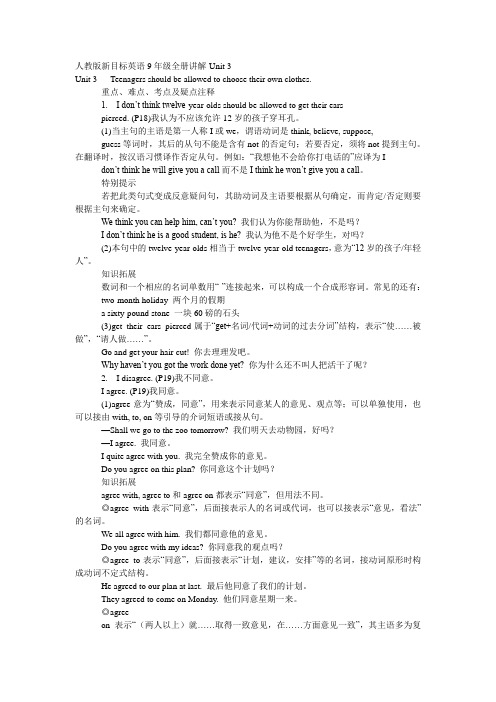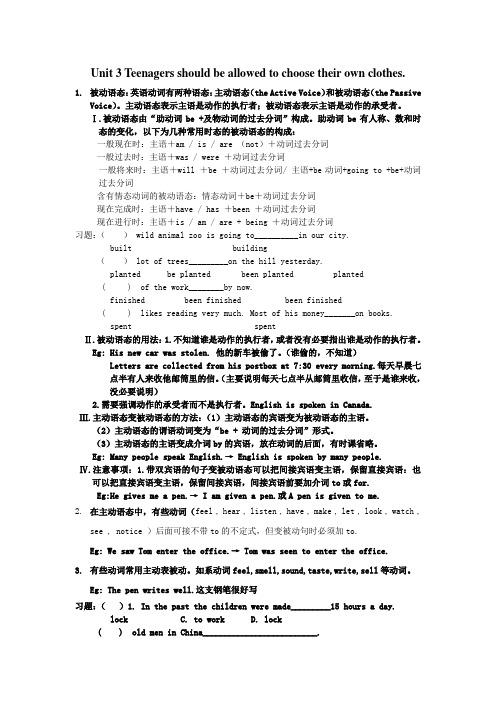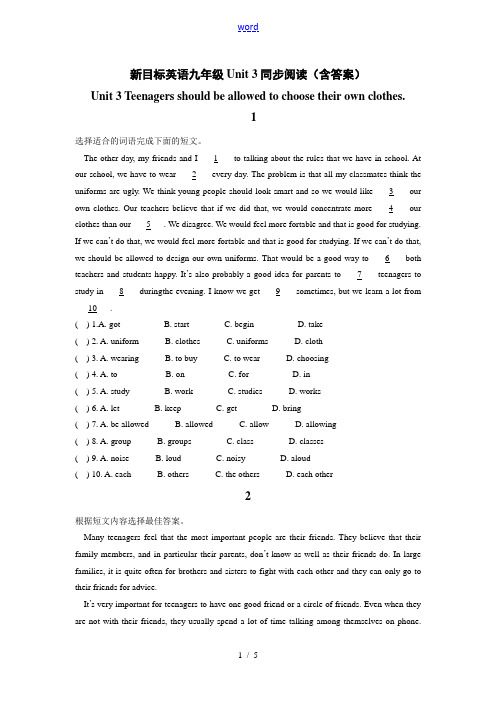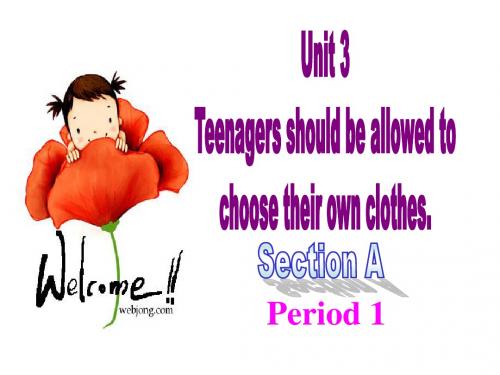[5课时]人教版九年级Unit 3 Teenagers should be allowed to choose their own clothes 导学案
人教版九年级英语unit3知识点,单词讲解

人教版新目标英语9年级全册讲解-Unit 3Unit 3 Teenagers should be allowed to choose their own clothes.重点、难点、考点及疑点注释1. I don’t think twelve-year-olds should be allowed to get their earspierced. (P18)我认为不应该允许12岁的孩子穿耳孔。
(1)当主句的主语是第一人称I或we,谓语动词是think, believe, suppose,guess等词时,其后的从句不能是含有not的否定句;若要否定,须将not提到主句。
在翻译时,按汉语习惯译作否定从句。
例如:“我想他不会给你打电话的”应译为I don’t think he will give you a call而不是I think he won’t give you a call。
特别提示若把此类句式变成反意疑问句,其助动词及主语要根据从句确定,而肯定/否定则要根据主句来确定。
We think you can help him, can’t you? 我们认为你能帮助他,不是吗?I don’t think he is a good student, is he? 我认为他不是个好学生,对吗?(2)本句中的twelve-year-olds相当于twelve-year-old teenagers,意为“12岁的孩子/年轻人”。
知识拓展数词和一个相应的名词单数用“-”连接起来,可以构成一个合成形容词。
常见的还有:two-month holiday 两个月的假期a sixty-pound stone 一块60磅的石头(3)get their ears pierced属于“get+名词/代词+动词的过去分词”结构,表示“使……被做”,“请人做……”。
Go and get your hair cut! 你去理理发吧。
九年级Unit 3 Teenagers should be allowed to choose their own clothes.的语法知识点

Unit 3 Teenagers should be allowed to choose their own clothes.1.被动语态:英语动词有两种语态:主动语态(the Active Voice)和被动语态(the PassiveVoice)。
主动语态表示主语是动作的执行者;被动语态表示主语是动作的承受者。
Ⅰ.被动语态由“助动词be +及物动词的过去分词”构成。
助动词be有人称、数和时态的变化,以下为几种常用时态的被动语态的构成:一般现在时:主语+am / is / are (not)+动词过去分词一般过去时:主语+was / were +动词过去分词一般将来时:主语+will +be +动词过去分词/ 主语+be动词+going to +be+动词过去分词含有情态动词的被动语态:情态动词+be+动词过去分词现在完成时:主语+have / has +been +动词过去分词现在进行时:主语+is / am / are + being +动词过去分词习题:() wild animal zoo is going to__________in our city.built building() lot of trees_________on the hill yesterday.planted be planted been planted planted( ) of the work________by now.finished been finished been finished( ) likes reading very much. Most of his money_______on books.spent spentⅡ.被动语态的用法:1.不知道谁是动作的执行者,或者没有必要指出谁是动作的执行者。
Eg: His new car was stolen. 他的新车被偷了。
(谁偷的,不知道)Letters are collected from his postbox at 7:30 every morning.每天早晨七点半有人来收他邮筒里的信。
九年级英语 Unit 3 Teenagers should be allowed to choose their own clothes. 讲解与练习

第 1 页 (共4 页) 第 2 页 (共4 页)学校 姓名 班级 考场 考号---------------------------------○密------------------ -------------------○封----------------------------- -- --○线----------------------------※※※※※※※※※※※※※※※答※※※※※※※※※※※※※※※※※※题※※※※※※※※※※※※※※※※线※※※※※※※※※※※※※九年级英语 Unit 3: Teenagers should be allowed tochoose their own clothes. 讲解与练习重点短语take the test 参加考试 pass the test 通过考试 fail a test 考试失败be strict with+人 对某人严格be strict in+事物 对某事要求严格stay up 熬夜have an opportunity to do sth.有机会做某事=have a chance to do/ of doing every other day 每隔一天 (每两天)clean up 打扫 整理learn from each other 互相学习concentrate on 专注于 one’s own 某人自己的the other day 前几天,几天前 = a few days ago= every two days at present 现在,目前 in this way 用这种方法in the way 挡道的,妨碍人的on the way 在路上 on one’s way to 在某人去…的路上 by the way 顺便说(问)be serious about 对…认真care for 在乎、关心 【语言点】1. Teenagers should be allowed to choose their own clothes.应该允许青少年选择自己的衣服。
人教版九年级 导学案Unit 3 Teenagers should be allowed to choose their own clothes

Unit 3 Teenagers should be allowed to choose their own clothes第一课时Section A 1a-2c【三维目标】1知识目标:四会单词短语及句型。
2能力目标:能在具体语境中正确运用被动语态。
3情感目标:增强交际能力,培养关心他人,礼貌待人的品质。
【学习重难点】:重点词汇用法及正确运用被动语态【学习过程】(一)预习导学:熟读单词并找出SectionA1a-2c中的重难点(二)朗读Section A 1a-2c,找出下列短语。
16岁的青少年____________________ 被允许__________________ 打耳洞___________和朋友一起外出_______________ 不够认真______________ 年龄不够大__________不够沉着__________________ 太狂热__________________ 太愚蠢______________(三)课堂活动.(教师寄语: 展示自我,合作提高)1.检查课前预习,小组合作交流讨论解决问题,并完成要点导学。
2. 听录音,完成1b,2a和2b。
3.读听力材料,理解以下几个句子:Go to the mall with John. Get her ears pierced. Is allowed to choose her own clothes(四)合作探究:Talk about what you are allowed to do导学1:teenagers should be allowed to choose their own clothes.(1).should be allowed为含有情态动词的被动语态,英语动词有两种语态,既主动语态和被动语态,主动语态表示主语是动作的执行者,被动语态表示主语是动作的承受者.被动语态的构成:主语+be+及物动词的过去分词be有人称和时态的变化.Eg: 我们学校每年都栽树. Trees in our school every year.这本书是昨天买的The book yesterday.含有情态动词的被动语态其结构为:情态动词+ be+及物动词的过去分词Eg: 作业应该按时上交。
unit3《teenagersshouldbeallowedtochoosetheirownclothes》教材全析(人教新目标初三)doc初中英语

[教材全析]友情提示SECTION ALanguage Goal:Talk about what you are allowed to do.Agree and disagree.语言目标:谈论你们被承诺做什么。
同意和不同意。
1a Read the statements below.Circle 〝A〞(for agree) or 〝D〞(for disagree).读下面的陈述。
圈出A(表示同意)或D(表示不同意)。
A D 1.I think teenagers①should be allowed to go out with their friends every night.我认为十几岁的青青年应当被承诺每晚同朋友们外出。
A D 2.Sixteen-year-olds should be allowed to drive.十六岁的青青年不应当被承诺驾车。
A D 3.Students should not be allowed to have part-time②job.学生们不可被承诺有兼职的工作。
A D 4.I don’t think twelve-year-olds should be allowed to get their ears pierced.我认为十二岁的青青年不应当被承诺打耳眼。
A D 5.I think twelve-year-olds③should be allowed to choose their own clothes.我认为十二岁的青青年应当被承诺选择自己的衣服。
含有助动词should的句子要变成被动语态,其方法是将主动语态中的宾语提到句首,然后在should后面跟被动语态的差不多结构be+v.过去分词。
将主语加上介词by放在句子末尾。
例题探究:Tom should be allowed to make friends with these teenagers by us.〔变成主动语态〕1b Listen and circle 〝T〞(for true) or 〝F〞(for false).听同时圈出T(对)或F(错)。
人教版英语九年级Unit 3同步阅读(含答案)

新目标英语九年级Unit 3同步阅读(含答案)Unit 3 Teenagers should be allowed to choose their own clothes.1选择适合的词语完成下面的短文。
The other day, my friends and I ___1___ to talking about the rules that we have in school. At our school, we have to wear ___2___ every day. The problem is that all my classmates think the uniforms are ugly. We think young people should look smart and so we would like ___3___ our own clothes. Our teachers believe that if we did that, we would concentrate more ___4___ our clothes than our ___5___. We disagree. We would feel more fortable and that is good for studying. If we can’t do that, we would feel more fortable and that is good for studying. If we can’t do that, we should be allowed to design our own uniforms. That would be a good way to ___6___ both teachers and students happy. It’s also probably a good idea for parents to ___7___ teenagers to study in ___8___ duringthe evening. I know we get ___9___ sometimes, but we learn a lot from ___10___.( ) 1.A. got B. start C. begin D. take( ) 2. A. uniform B. clothes C. uniforms D. cloth( ) 3. A. wearing B. to buy C. to wear D. choosing( ) 4. A. to B. on C. for D. in( ) 5. A. study B. work C. studies D. works( ) 6. A. let B. keep C. get D. bring( ) 7. A. be allowed B. allowed C. allow D. allowing( ) 8. A. group B. groups C. class D. classes( ) 9. A. noise B. loud C. noisy D. aloud( ) 10. A. each B. others C. the others D. each other2根据短文内容选择最佳答案。
新人教版九年级英语《Teenagers-should-be-allowed-to-choose-their-own-clothes》教学设计

《Teenagers should be allowed to choose their own clothes》教学设计教学内容分析:本单元以学生是否应该挑选自己的衣服为话题,以谈论学生在生活中应当遵守的规矩和学生自己的意见为主线,向学生展示了的用于表达被或不被允许做某事和同意不同意的目标语言。
教学目标:1.词汇:allow, pierce, silly, stay up, drivers’ license earring, strict, concentrate, volunteer,目标语言:I think sixteen-year-olds should be allowed to drive.I disagree. I think sixteen is too young.Do you think thirteen-year-olds should be allowed to have part-time jobs?No, I don’t.2.通过目标语言的学习,学生学会谈论自己平时需要遵守的规则,并能发表自己的看法或独特见解。
3.教育学生要在培养自己的独立思想的同时注意遵守规章制度。
教学重点及难点:1.本单元重点在于新单词及目标语言,并再次出现了被动语态。
2.难点在于学生运用目标语言进行自由表达及对被动语态的掌握。
课时分配(5课时):第一课时:Section A 1a---2c Grammar Focus第二课时:Section A 3a---4第三课时:Section B 1a---2c第四课时:Section B 3a---4 Self Check 2第五课时:Reading: That’s cool教学指导思想:以素质教育为指导思想,促进学生个性发展,注意对学生进行思想引导,培养学生正确认识个性及美丑。
教学方法:听说读写相结合,循序渐进;设计合理并具有挑战性任务,让学生在完成任务时练习使用目标语言,体验成功之快乐教学过程设计:Period OneStep 1 Greeting and a small talkThe S on duty gives a small talk on her unpleasant shopping(her mother didn’t let her choose her own clothes) to lead in the topic of Unit 3 “Teenagers should be allowed to choose their own clothes” Then, Ss show their own opinion by saying “agree” and “disagree”Step 2 Do you agree or disagree1a Read the statements in the textbook. Circle A or DStep 3 Pairwork 1cGet students to tell out their “agrees”and “disagrees”,as well as their reasons, to their partners. T moves around to give help if necessary.Step 4 Listening practice1b Get Ss to look at the picture and tell them they are going to hear a conversation between Anna and her mother. Listen and circle T of F (for the first time, Ss only listen.) Then check the answers: F, F, T 2a-2b Do the same with them as 1bFirst get Ss to list out teenagers should and should not be allowed to do. Then discuss their lists with their partners using the short conversation in the right box.Step 6 Task1:Get Ss to list out what they are and are not allowed to do and make comments about them. (to get Ss practice talking about their realexperience and feelings with the target language)Step 7 Grammar focusGet Ss first to read out the statements and then give out their own opinions to replace the statements in the right column.Step 8 Summary and homework:What rules do you have at home? Make a list of them.Period TwoStep 1 GreetingGreet the class and check the homeworkStep 2 A duty reportThe S on duty gives a report on the rules in his home and lead in 3a “Sun Fei’s and Wu Yu’s rules”Step 3 ReadingSs read the conversation and write the two girls’rules in the chart.Check the answers.Get Ss to read after the tape and then read aloud by themselves.Then, T explains the language points.Step 4 Pairwork 3bRole play. Use the information in chart to practice with the conversation in 3a covered. They can look at the sample conversation in the right box.Step 5 Task 2 “Who’s the best reporter?”Make a survey by asking any 5 students the questions in the chart in activity 4. Then give out a report about it. See who is the best reporter? And the best reporter will get a nice ball-pen.Step 6 Summary and homework:Write out the report in your exercise-books.Period ThreeStep 1 Greeting and a duty reportThe S gives a duty report talking about his experience of being late for school. Lead in the question “Do you ever get to school late? How often do you get to school late? Always, usually, sometimes, or never?Step 2 1a Get Ss to finish writing.Step 3 Pairwork 1bGet Ss to talk about their answers with their partners using the sample conversation in the box on the right.Step 4 Listening practice2a Lead-in: What will happen if you get to school late? What about Peter? Let’s listen to a conversation between Peter and his father. Get Ss to finish 2a (As usual, for the first time, Ss only listen.) Check the answers.2b Listen again, match these sentences parts. Check the answers.Step 5 Groupwork 2cSs discuss the statements with their group members to practice oral English.Step 6 Task 3:A debateChoose one statement (No.3 Parents should not be too strict with teenagers.) as the topic for them to debate. Those who agree sit on one side, those who disagree sit on the other side. Before starting, each group have 2 minutes to get prepared. See which group is the winner.While debating, Ss should write down the opinions they hear for their homework.Step 7 Summary and homeworkWrite an article about your own opinions to the topic debated in class.Period FourStep 1 GreetingGreet the class as usual and check the homework. Get two students to read out their articles to the class.Step 2 ReadingLeading-in: Everyone of you has your own thought. Let’s read an article written by a teenagers like you. While reading, please try to find out the answers to the questions below.Check the answers.T plays the tape for Ss to listen and repeat. Then get them to read it out loudly.T explains some language points.Step 3 Pairwork 3bRole play. Use the information in 3a to have a conversation like the sample conversation in the box.Step 4 Task 4 The best opinion“What school rules do you think should be changed in our school?”Get Ss to discuss with their partners and then write down what both of them think should be changed on the paper given by T. Later, discuss those statements on the paper with the whole class and tell them to give the best one to the headmaster as good advice.Step 5 Task 5 4Suppose: you and your partner are starting a new Saturday English club. Discuss with him. Make a list of rules about what should and should not be allowed.Step 6 Writing practiceSelf Check Ex.2 get Ss to read the article and then practice writing a letter using the target language.Step 7 Summary and homeworkFinish Ex.1 in Self Check.Period FiveReading---That’s cool.Step 1 Warming-upAsk: What does the word “cool” mean to you? Give some examples. Sstalk about their own opinions freely.Step 2 While-readingGo through the reading and match the people with their opinions in 2 on page 24 and complete the sentences in 4 on page 25.Step 3 Deep comprehensionSs read the article more carefully. Try to guess the meanings of the new words. And match the words and expressions with their meanings in 3 on page 25. Then get Ss to make sentences with them.Step 4 Groupwork 5Get Ss to finish the groupwork in 5 on page 25 by asking their group members.Step 5 Summary and homeworkWrite a report about what your classmates think about “cool”.。
九年级英语全册 Unit 3 Teenagers should be allowed to choo

Unit 3 Teenagers should be allowed to choose their own clothes听说课 Section A (1a-2c)Learning GoalsTalk about the rules that teenagers should do and shouldn’t do and express one’s o pinion. We can use The Passive Voice (should be allowed) and these pattens: Sixteen-year-olds should not be allowed to work at night. He doesn’t seem to have many friends. --I think students should be allowed to do homework with friends. --I disagree.They talk instead of doing homework. --I don’t think students should be allowed to drive. --I agree.They aren't serious enough at that age. Learn to express what rules that we should obey and what rules are unfair to students . Get the students to learn to think over the rules.(目标引领,用一段话表述了本节课的知识、能力和情感目标。
)Teaching steps (教学步骤)Preview: 本课重点用should be allowed to do something 谈论一下青少年应该干什么不应该干什么,培养青少年自我判定是非的能力。
人教版九年级英语unit3_Teenagers_should_be_allowed_to_choose_their_own_clothes

目标语言(Target Language) 1. I think sixteen-year-olds should be allowed to drive . 我认为应该允许16岁的孩子开车。 2. I disagree . I think sixteen is too young. 我不同意,我认为16岁这个年纪太年轻了。 3. Do you think thirteen-year-olds should be allowed to have part-time jobs ? 你认为应该允许13岁的孩子们做兼职工作 吗? 4. No , I don’t . 不,我认为不应该。
Period 1
Grammar
被动语态 1. ―语态”表示主语和谓语动词之间的关系。 英语中有“两态”的说法,即主动语态和被 动语态,本单元中反复出现的should be allowed 就是一个含有情态动词(should)的 被动语态。 先看几个基本概念 主语是动作的发出者为主动语态 主语是动作的接受者为被动语态 只有及物动词才有被动语态。
their own clothes.
1b
Listen and circle ―T‖ for true or ―F‖ for false..
如:We should allow teenagers to surf the Internet . -Teenagers should be allowed to surf the Internet. Can you use it ? 你会使用它吗? -Can it be used ?
They take good care of my child. -My child is taken good care of . 他们把我的孩子照顾得很好。 I turned off the radio. -The radio was turned off (by me). 附:动词短语的被动语态 take care of -be taken care of cut down -be cut down laugh at -be laughed at look after-be looked after
九年级英语全册 Unit 3 Teenagers should be allowed to choo

Unit 3 Teenagers should be allowed to choosetheir ownclothes.Reading教学目标1.掌握课文中出现的一些新词汇和词组表达。
2.根据阅读材料的内容提取要点,实现对文章内容的理解。
3.就阅读材料的内容提出自己的观点和想法。
教学重点1.学习并掌握一些生词及短语。
2.提高学生的阅读能力。
教学难点掌握谓语动词被动结构的用法及含义。
教学过程Step 1:Warmup让学生两人一组讨论:What should we be allowed to do after school?尽量运用句型:I think we should be allowed to...; I agree/disagree...Step 2:Leadin老师可以问学生:Do you like sports?What sports do you like best?Can you make your own decisions?让学生讨论这些问题,并给出他们的答案。
Step 3:Before reading小组讨论:1.How old is a teenager?2.What are some of the ru les that a teenager should obey?让学生谈论文中图片,老师可以提供一些帮助。
Step 4:While reading1.让学生首次阅读,画出文章中的重点词组并掌握文章大意。
2.让学生再次阅读,完成预习导航中的表格。
3.让学生第三次阅读,解决疑难问题。
Step 5:After reading1.让学生在文章中找到3a中的词组,理解它们的意思,并造句。
2.让学生再次快速地浏览文章并找到更多的例子填到3b相应的地方。
3.让学生讨论刘云应不应该被允许练习跑步,和同桌讨论并用文章中的信息来支持自己的观点。
Step 6:HomeworkT:Have you got anything that your parents don't allow you to do?Do you agree with them?Then write down your own opinions.Maybe you could show it to your parents.1。
九年级英语全册Unit3Teenagersshouldbeallowedtochoosetheiro

新疆和静县第二中学九年级英语全册《Unit 3 Teenagers should be allowed to choose their own clothes》温习(无答案)人教新目标版自主温习(P57words and phrases )句子再现1. Teenager should be allowed to go out with their friends every night.2. Students should not be allowed to have part-time jobs.3. I don’t think sixteen- year-olds should be allowed to drive.4. He should stop wearing that silly earring.5. He doesn’t seem to have many friends.6. I’m allowed to go to the movies with friends on Friday nights. Me, too, but I have to b e home by 10:00 pm.7. Find someone who is allowed to stay up until 11:00 pm.8. Parents should not be too strict with teenagers.9. The problem is that all my classmates think the uniforms are ugly.10. We think young people should look smart and so we would like to wear our own clothes.11. Our teachers believe that if we did that, we would con centrate more on our clothes than our studies.12. We would feel more comfortable and that is good for studying.13. I know we get noisy sometimes, but we learn a lot from each other.14. Last summer I had an opportunity to volunteer at the local hospital, but I couldn’t because Ihad to go back to school.15. I can’t choose which pair of jeans to buy. They both look good on me.16. Last year we went to an old people’s home and sang songs and performed a play for them.17. For example, we should v isit primary schools and help teach young students.18. Some students should be allowed to have Friday afternoons off to volunteer and help others.19. But sometimes these hobbies can get in the way of schoolwork, and parents might worry about theirchild’s success at school.20. However, his parents won’t allow him to train as much as he would like to.21. Now that he is getting older, he needs to think about what will happen if he doesn’t become aprofessional runner in the end.22. But I’m serious about running. Being a professional runner is the only thing I want to do.23. We don’t allow him to practice every day because we think he needs to spend time on his homework.24. I know my parents care about me. But they are always talking about what will happen if I don’tsucceed.课文温习 3a The other day, my friends and I _______(talk) about the rules that we have in school . At our school , we have to wear _____________ (校服) everyday . The problem is that all my classmates think the uniforms are ugly . We think young people should look______( smart) and so we would like to wear our own clothes . Our teachers believe that if we ______ (do) that , we would __________(专注) more on our clothes than our studies . We ______(agree). We would feel ________(comfortable ) and that is good for studying . If we can’t do that , we should ______ ________(allow) to design our own uniforms . That would be a good way to keep both teachers and students happy.It’s also probably a good idea for parents to allow teenagers ______ (study) in group during the evening. I know we get _______ (noise) sometimes , but we learn a lot from each other . We also thinkthat vacations should be _______ (long) . ___ ___ (目前) they’re too short . Longer vacations wouldgive us time to do things like _______ (volunteer) . Last summer I had an opportunity _____ (volun teer)at the local hospital , but I couldn’t because I had to go back to school . It would be a good _____(经历) for me because I want to be a doctor when I’m older.【考点归纳】 1.语态:①英语有两种语态:主动语态和补动语态主动语态表示是动作的执行者被动语态表示主语是动作的经受者Cats eat f ish. (主动语态)猫吃鱼。
- 1、下载文档前请自行甄别文档内容的完整性,平台不提供额外的编辑、内容补充、找答案等附加服务。
- 2、"仅部分预览"的文档,不可在线预览部分如存在完整性等问题,可反馈申请退款(可完整预览的文档不适用该条件!)。
- 3、如文档侵犯您的权益,请联系客服反馈,我们会尽快为您处理(人工客服工作时间:9:00-18:30)。
Unit 3 Teenagers should be allowed to choose their own clothes 本单元主要是学习被动语态,通过学习要能熟练掌握被动语态的用法及构成。
第1课时Section A 1a-2c (编写人:龙俊)【学习目标】1知识目标:四会单词短语及句型。
2能力目标:能在具体语境中正确运用被动语态。
3情感目标:增强交际能力,培养关心他人,礼貌待人的品质。
【学习重难点】:重点词汇用法及正确运用被动语态【学习过程】(一)预习导学:熟读单词并找出SectionA1a-2c中的重难点(二)朗读Section A 1a-2c,找出下列短语。
16岁的青少年____________________ 被允许__________________打耳洞___________和朋友一起外出_______________ 不够认真______________ 年龄不够大__________不够沉着__________________ 太狂热__________________太愚蠢______________(三)合作探究:Talk about what you are allowed to do导学1:teenagers should be allowed to choose their own clothes.(1).should be allowed 为含有情态动词的被动语态,英语动词有两种语态,既主动语态和被动语态,主动语态表示主语是动作的执行者,被动语态表示主语是动作的承受者.被动语态的构成:主语+be+及物动词的过去分词be有人称和时态的变化.Eg: 我们学校每年都栽树. Trees in our school every year.这本书是昨天买的The book yesterday.被动语态的用法:(1)不知道动作的执行者是谁。
这栋楼是5年前建的。
The building was built 5 years ago. (2)没有必要指出谁是动作的执行者。
校园天天都被打扫。
The school yard every day. (3)需要强调动作的承受者。
Eg: 英语被广泛应用。
English widely含有情态动词的被动语态其结构为:情态动词+ be+及物动词的过去分词Eg: 作业应该按时上交。
The homework should be handed in on time导学2:Sixteen-year-olds should be allowed to get their ears pierced.应该允许16岁的孩子扎耳眼(1).sixteen-year-olds “16岁的孩子”其等同于sixteen-year-old boys\girls,是由“数词+名词+形容词”构成的合成词。
Eg.My ten-year-old brother is in this school.我10岁的弟弟在这所学校。
(2).get/make/have sth. done 使某事被做;请别人做某事。
Eg: We have got/made/had the TV repaired. 我们已经请人把电视修好了。
导学3 :she asked me to help her and I agreed.她要我帮忙,我同意了。
agree to (do) sth.同意(做)某事agree with sb.同意某人(的意见)agree on (sth.)(就某事)达成一致意见导学4:stop doing sth. 停止做某事注意:Stop to do sth表示“停止某事而去做另一件事”。
Eg . They stopped talking when he came in.当他进来时,他们停止了说话。
导学5:instead of “代替;而不是”导学6:It does’t look cool.look 构成系表结构。
连系动词一般分为三类(四)课堂活动.(教师寄语: 展示自我,合作提高)1.检查课前预习,小组合作交流讨论解决问题,并完成要点导学。
2. 听录音,完成1b,2a和2b。
3.读听力材料,理解以下几个句子:Go to the mall with John. Get her ears pierced. Is allowed to choose her own clothes4.课堂小结:回顾本节课,学到了什么,还有什么疑问?1)你的疑问:2)你学到的知识:5.检测反馈。
(教师寄语:相信自己,你是最棒的!)一、单项选择:1. Students shouldto choose their own clothes.A. allowB. allowedC. are allowedD. be allowed2. The flowers by the students yesterday.A. are wateredB.wateredC. were wateringD. were watered3. Did you get your ears?A. pierce B. to pierce C. pierced D. piercing4. Do you think should drive?A. sixteen-years-oldB. sixteen-year-oldsC. sixteen-years-oldsD. sixteen-year-old5. You should have your hair。
A. cut B. cutting C. cutted D. to cut6. “Stop, and listen to me,” the teacher said.A. talk B. talking C. to talk D. talked7.John likes tomatoes.。
A. So I doB. So am IC. So do ID. So I am2.根据汉语完成下列句子。
1、我们允许在星期六晚上看电视。
We on Saturday evening.2.如果你努力学习你会通过考试的。
If you work hard, you’ll。
3、我将代替你去。
I will go.4.我每天必须打扫我的房间。
My room by every day.Unit 3 Teenagers should be allowed to choose their own clothes 第二课时Section A 3a-4 (编写人:龙俊)【学习目标】1.知识目标:四会单词短语及句型。
2.能力目标:能在具体语境中正确运用被动语态。
3.情感目标:增强交际能力,培养关心他人,礼貌待人的品质。
【学习重难点】:重点词汇用法及正确运用被动语态;正确运用被动语态【学习过程】一预习导学:熟读单词并找出SectionA3a-4中的重难点二自主学习:朗读Section A 3a-4,找出下列短语。
例如____________和朋友一起去看电影________________在星期五晚上__________熬夜____________上学其间外出_________________周末早起________________三合作探究:导学1:Well,I’m allowed to go to the movies with friends on Friday nights。
注:at,on,in的用法。
(1)at表示时间时用于钟点前,用于时刻前,译为"在……时(刻)"。
如:at three/three o'clock在三点,at a quarter to six六点差一刻at noon在中午,at night在夜晚,at midnight在半夜(2)in表示时间时用于泛指一天的上午,下午,晚上等;用于某个较长的时间,如年,月,季节等。
如:in the morning/afternoon/evening在上(下午)或晚上,in 2003在2003年,in the day/daytime在白天(3)on表示时间时用于星期、日期(包括该天的各部分)。
如:on Sunday/Sundays,on Monday morning/afternoon/evening等。
on也用于某一日的名词前,用于公共节假日前。
如:On New Year's Day在元旦,on Children's Day在儿童节等。
导学2:Stay up 意为“不睡觉;熬夜”Eg.1) He stayed up all night.他通宵未眠。
2) I stayed up because I wanted to talk something important to you.我没睡,因为我有重要的事情和你谈谈。
3)注意:sit up意为“迟睡;熬夜”导学3:--I like it.我喜欢它。
--So do I.我也喜欢。
第二句是一个“so+主语+助动词/be动词/情态动词”结构的倒装句,表示前面所说的肯定情况同样适合于后者。
do是助动词,随主语的人称和数而变化,且时态要与上句的时态一致。
四. 课堂活动.(教师寄语: 展示自我,合作提高)1.检查课前预习,小组合作交流讨论解决问题,并完成要点导学。
2. 充分朗读3a部分,争取做到熟记于心。
3.试着与其他同学扮演不同角色,充分利用3a中的对话并进行练习。
4.课堂小结:回顾本节课,学到了什么,还有什么疑问?1)你的疑问:2)你学到的知识:5.检测反馈。
(教师寄语:相信自己,你是最棒的!)一、单项选择1.His father likes going hiking..A. So does his motherB. So is his motherC. So his mother isD. So his mother does2.I don't like this pair of football shoes,.A.eitherB.neitherC.tooD.also3.Did your teacher allow youhome?A.go B.to go C.goingD.went4.We aren't allowed to go outschool night.A.at B.on C.in D.for5.The fruit should be wellduring water.A.keepB.keptC.keeping D.to keep二、用所给词的适当形式填空1.The classroom should (clean)every day.2.The workers are made (work)oven ten hours.3.He needs (have)a good rest.4.Jim (read)that book,didn't he?5.My father had his hair (cut)yesterday.三、根据汉语提示完成下列句子,每空一词1.Do you like (熬夜)?2.I do my homework, Mike.(迈克也是)3.I (起床)at 8:00 this morning.4.Let’go shopping .(在星期六)5. (看电视)too much is bad for your eyes.Unit3 Teebagers should be allowed to cloose their own clother第三课时SectionB 1a~3a(编写人:龙俊)【学习目标】:1.学习并掌握本课单词;2.掌握下列句型①Do you ever get to class late?Yes, I sometimes get to class late.②Peter should be allowed to take the test later.③Parents should not be too strict with teenagers. 【学习过程】:一、课前预习:(教师寄语:预习感知,有备无患。
